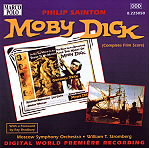British composer Philip Sainton’s only film score is also his largest, and in some ways most successful work. Compared to the lush productions of the more famous Hollywood composers (Steiner, Korngold, and Newman), his orchestration sounds positively austere, though it’s rich enough by ordinary symphonic standards. In any event, it perfectly suits the film’s grim, New England setting. As a product of the “Vaughan Williams” school, Sainton’s music belongs squarely in the tradition of contemporaries such as Finzi, Howells, and Grace Williams, and anyone who enjoys these composers will find his music equally appealing. There’s even a hint of Delius, particularly noticeable in the recurring episodes portraying the sea. Conductor William T. Stromberg and the Moscow Symphony Orchestra perform the music with total conviction, and deserve a great deal of credit not just for restoring a major film score to currency, but for recreating the major achievement of a minor but very engaging member of what has become known as the English musical renaissance. The value of this release extends well beyond the realm of the movie music aficionado.
































